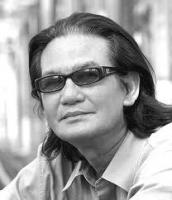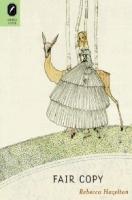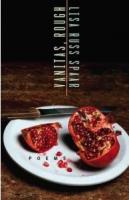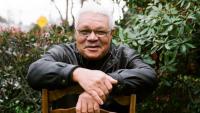December 18, 2012
Edited by David Sanders
Specimen Days
December 18, 2012
1803 – Johann G. von Herder, German philosopher/theologist/poet, dies at 59.
1819 – Yakov Petrovich Polonsky, Russian poet (Stichotvorenija), is born.
1831 – Willem Bilderdijk, Dutch poet/literary (My Relief), dies at 75.
1977 – Louis Untermeyer, poet/critic, dies at 92.
1985 – Xuân Diệu, Vietnamese poet (b. 1916), dies.
 Let’s bring our heads together, press our breasts!
Let’s bring our heads together, press our breasts!
Let our hair short and long mingle!
Our arms! Let them squeeze our shoulders!
Let our love well up in our eyes!
Let’s close our lips with a tight seal
So I can hear the pearls of your teeth.
Enraptured I fain say to you,
“Come closer! You are still too far away!”
from “Still Too Far Away” by Xuân Diệu, 1916–1985
Poetry In The News
A Stamp on the Outside, Intimacy on the Inside

“I seem to spend my life missing you,” Robert Lowell wrote to Elizabeth Bishop, many years after the long and intimate friendship between these two great American poets began. In another letter he sadly observed, “We seem attached to each other by some stiff piece of wire, so that each time one moves, the other moves in another direction.” The geographical distance between them, breached only rarely during their sometimes tumultuous lives, was a deeply felt burden to both — if perhaps occasionally a blessing, too. Read more at the New York Times.
“Rock Me, Mercy”: A Poem Written In Mourning
The heartbreaking loss of lives in Newtown, Conn., moved the Louisiana-born poet Yusef Komunyakaa to put his emotions into words. The global distinguished professor of English at New York University knows too well how it feels to lose a child and poetry’s power to calm and heal. Read more at NPR.
World Poetry
The Kagay-anon Poet
New Books
Fair Copy by Rebecca Hazelton

[Paperback] Ohio State University Press, 80 pp., $16.95
Fair Copy, by Rebecca Hazelton, is a meditation on the difficulties of distinguishing the real from the false, the copy from the original. It is in part an exploration of the disparity between our conception of love as either true or false and the messy reality that it can sometimes be both. If “true” love is not to be found, is an approximation a “fair” substitute? Composed of acrostics from lines by Emily Dickinson, the collection retains a direct and recurrent tie to Dickinson’s work, even while Hazelton deftly branches off into new sonic, rhythmic, and conceptual territories.
Thank You for the Window Office by Maged Zaher
[Paperback] Ugly Duckling Presse, 88 pp., $15.00
Thank You for the Window Office is the third book by Egyptian-American poet and translator Maged Zaher. This is a book as much about alienation as it is about belonging. Zaher investigates the subtleties of place and identity in late-capitalism, the corporate world, and the dating scene. These poems navigate the linguistic landscapes that an immigrant writing in his non-native tongue negotiates daily in a foreign culture. This unusual confluence creates a wry exploration of the social and lingual that blends the musicality of the Arabic language with a sardonic humor unique to America popular culture.
Vanitas, Rough: Poems by Lisa Russ Spaar

[Paperback] Persea, 80 pp., $15.95
With her trademark language—baroque yet colloquial, immediately recognizable but impossible to duplicate—Lisa Russ Spaar has written her most sumptuous, alluring, and steamy poems to date, each one bursting with an appetite for the sensuous and the lingual. “Is syntax erotic?” she asks in Vanitas, Rough. “If so, please. Please read. Here.”
Appetite by Aaron Smith
[Paperback] University of Pittsburgh Press, 72 pp., $15.95
“I have been waiting for the follow-up to Aaron Smith’s Blue on Blue Ground with tremendous interest, and Appetite delivers. These poems showcase Smith’s compassionate intelligence with wit, joy, and lyric aplomb. Appetite is a book to live with, swoon over, and be chastened by. Give it to your friends. Give it to your enemies. This voice matters.” —Tracy K. Smith
Recent Reviews
Ferryman

by Daniel Bosch
“Ferry,” the English noun and verb, is derived from the Old Norse “ferja,” to move across a body of water. “Ferry” is related to German “fahren,” to ride, or to travel, the sense of which includes duration. It is richly cognate with the Latin “ferre,” to bear, which is legible in such common English words as “transfer,” “infer,” and “refer.” The two volumes that bookend poet David Ferry’s work to date are On the Way to the Island (Wesleyan, 1960), and his selected poems, out this month from Waywiser Press, On This Side of the River (2012). Read more at Berfrois.
Not Just to See and Note the Birds but to Say Them
by Charles Alexander
little red leaves / down to bare words
Both the name of this publisher and the first line of the book’s single poem answer each other, in their two four-syllable joinings of language to the natural world. But the words in the book are not so bare, sewn into covers whose outer life consists of light blue and white geometrical patterns that alternatively make me think of abstracted patterns of clouds and a weaving together of the world. Cranes and flowers grace the inner covers, and in the poems, a weaving of words, with little abstraction, though indicating a great and perhaps mystical geometry of nature. Read more at Jacket 2.
Got to Be Real: Body Sweats
by Vanessa Place
There once was a time when poets all came capitalized, when only to write was proof insufficient of one’s aesthetic veritas, when animas was real gravitas, when one had to, like the field primordial, fairly ooze with self-generation. That time, my piglets, is today. Alongside the sterile clucks over the crowd-sourced, and the batten on the autre donnèe, there is a cry for poet-authenticity like nobody’s business. And in the mirrored halls of SOULS NOT! FOR! SALE!, there is no portrait that hangs so heavy as the one that wears the crown. Read more at Constant Critic.
Dancing In Borrowed Time
by Bill Coyle
The epigraph to Andrew Sofer’s debut collection of poetry comes from Yehuda Amachai—“And for the sake of remembering / I wear my father’s face over mine”—and it could hardly be more apt. Among other things, the quotation prepares readers for the frequency with which Sofer’s father, who died in his early fifties while the poet was still in grade school, is invoked throughout the book. It raises complex questions of memory and identity, too, especially when one remembers that persona, whence person, originally referred to the masks worn by classical actors. And it allows Sofer, who was born in England but earned his undergraduate degree at the Hebrew University of Jerusalem, to acknowledge Amachai, that great poet of Jerusalem, as a poetic father. Read more at Contemporary Poetry Review.
Correspondences
E. O. Wilson and Poet Laureate on Altruism and Mystery

by Amy Maxmen
When two leading scholars get together to swap stories, you might expect the conversation to meander to unexpected places. This was certainly the case last week at the American Museum of Natural History in New York, where evolutionary biologist E. O. Wilson and former US poet laureate Robert Hass had a freewheeling discourse that became lost in the mysteries of nature. Read more at New Scientist.
Poet Tracy Smith on “Life on Mars”
Poet Tracy Smith won the Pulitzer Prize earlier this year for her book Life on Mars published in the Twin Cities by Graywolf Press. Smith spoke to The Daily Circuit during a recent trip to Minnesota. Listen at Minnesota Public Radio.
The Poetry Wars
by David Biespiel
One of the more mind-blowing get-togethers to take place in the last ten years occurred in Havana, Cuba, when Fidel Castro led a unique international conference that brought together participants in the Cuban missile crisis from the U.S., the former Soviet Union, and Cuba to discuss the events of October 1962. Events that gave the world its closest brush with nuclear war. Read more at The Rumpus
Broadsides
Poetry and Science, Method and Malaria
by Cameron Conaway
I opened with a guided meditation where I asked all in attendance to close their eyes and to imagine a woman lying on the floor in an African village. She’s wrapped in blankets, dying. As the room pulsed with silence I read a poem from Malaria: Poems that filled in any gaps their imagination may have left. I then delivered the following speech, albeit with some ad-libs. Two additional poems from the forthcoming book concluded the presentation. I hope poets, scientists and those not part of either field can find something useful here. Read more at the Examiner.
Science v. Poetry
by Priscilla Long
They are old enemies, or else they are old lovers. The poet Albert Goldbarth writes, “Perhaps the arts and the sciences have never slept together without one eye kept warily open.” However warily, though, they have slept together. There are points of connection, even intimacy. Read more at The American Scholar.
Is Ron Silliman Sane?
by Thomas Brady
The history of poetry is never the history of the best poems, but rather the history of change in poetry. —Ron Silliman
Ron Silliman took a break from his cutting and pasting video links on his no-comments-allowed blog, recently, to explain his love for Lyn Hejinian’s new book of poems. The paean reached heights like this: When, in 200 years, students are reading the poetry of Lyn Hejinian – as certainly they shall if humans are still about – those readers will undoubtedly begin with My Life (hopefully in its initial Burning Deck version, not because the earlier edition is “better,” but because that is the volume that changed the lives of so many other poets). Those who go on to read Hejinian’s finest work, however, will then turn to The Book of a Thousand Eyes, which Omnidawn brought out earlier this year. Read more at Scarriet.
Drafts & Fragments
Al Young’s Poem of the Month Says Goodbye to 2012

Download audio (MP3)
About a year ago, California’s former Poet Laureate, Al Young, came to us with an idea that he write an original poem for The California Report each month of 2012. Well, we took him up on that and over the past year he’s provided memorable verses, weaving in unique California names and places with state history, references to the seasons and personal reflections. He joins us to talk about the project and read his final piece for 2012. Read more at the California Report.
Envoi: Editor’s Notes
Two ideas worth considering, not mutually exclusive:
“To say that a poet is justified in employing a disintegrating form in order to express a feeling of disintegration, is merely a sophistical justification for bad poetry, akin to the Whitmanian notion that one must write loose and sprawling poetry to “express” the loose and sprawling American continent. In fact, all feeling, if one gives oneself (that is, one’s form) up to it, is a way of disintegration; poetic form is by definition a means to arrest the disintegration and order the feeling; and in so far as any poetry tends toward the formless, it fails to be expressive of anything.” —Yvor Winters
“In order to experience a poem, we must understand it; in order to understand it we must hear it, see it, contemplate it—convert it into an echo, a shadow, nothingness. Comprehension is a spiritual exercise.” —Octavio Paz
—David Sanders